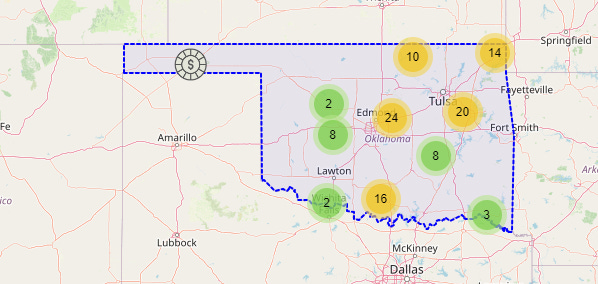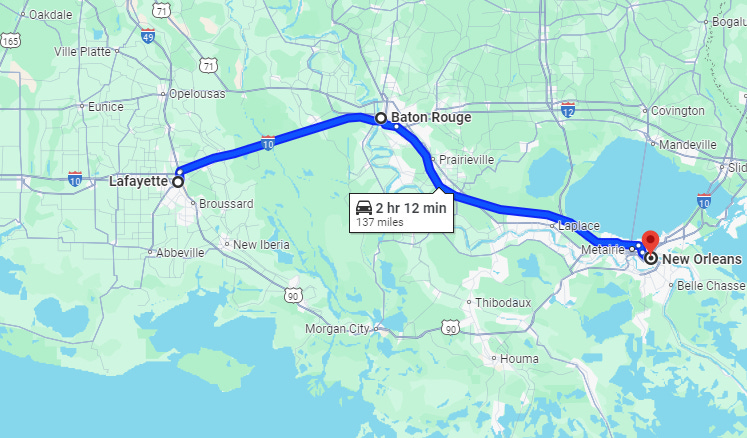Weekend thoughts: the unique economic model of regional casinos
I’ve been thinking a lot about casinos and gambling recently (in part because of Jacob Rubin’s CZR pitch on the podcast). There’s a dynamic to casinos, particularly regional casinos, that just really fascinates me, and I thought I’d just put some pen to paper on it because I can’t think of any other business like it.
The dynamic is this: a regional casino tends to pull from people within about an hour drive of the casino. This might be easiest to see on a map, so I’ll use my home state of Louisiana as an example. Baton Rouge is right in the middle of both Lafayette and New Orleans, and it is roughly a one hour drive from both. Imagine we lived in a world where there were no casinos in all of Louisiana and the only people who lived in Louisiana lived in Lafayette and New Orleans.
Now imagine a developer wins a license to build a casino in Baton Rouge (which, in our hypothetical world, has no people in it, so they’re building in the middle of no where)! That new casino is going to do amazing business; it’s going to pull heavily from both New Orleans and Lafayette.
But that casino is vulnerable… what happens if someone built a similar casino right outside of New Orleans, and someone else built a similar casino right outside of Lafayette?
Suddenly the Baton Rouge casino is dominated; time is valuable (in this case, it’s literally money!). People from Lafayette will prefer to save themselves the hour drive and just go to the new Lafayette casino, while people in New Orleans do the same with the New Orleans casino. All else equal, no one has any incentive to go spend an extra ~hour driving to the Baton Rouge casino when they can just go to their new local spot.
Here’s the part of the business that interests me: in any other business, the major way to overcome that driving time issue is with price. For example, a hotel an hour away from Disney World can still lure Disney World customers because they’ll price much cheaper than a similar hotel right next to Disney World.
But there’s no way to discount for price at a casino; when someone goes to gamble, they are already making an uneconomic decision! A casino advertising “over the long run, you’ll lose money to us, but you’ll lose it at a slightly slower clip than if you were playing at our competitors!” probably isn’t going to win any marketing awards. I’m not a huge gambler, but I’ll go every now and then with my friends…. and not once have we ever said “O I think the house edge is 2% at this casino, but if we drive an hour it’s only 1% there so let’s do that.”
Now, having no price levers to pull doesn’t mean a casino has no levers my hypothetical Baton Rouge casino has to pull to get traffic. They can offer people free game play (i.e. here’s $20 for the slots on us), comped hotel rooms (come stay the night and gamble!), free dinners, or pay for expensive entertainment to lure people in (i.e. subsidize a big name comedian to host a show, which will draw in people who might gamble after).
But all of those gives are expensive! And they’re also indirect; if a comedian draws in a crowd of 100 people, there’s no guarantee that any of them will gamble. Heck, a comped hotel room might not result in someone gambling (though a casino can generally use their player management system to ensure they’re only offering free hotel rooms to people who are likely to gamble!), and if you send everyone $20 in free slot play there’s a chance you’re going to have a lot of people come to your casino, use their $20 in free slot play, and then leave without ever putting a single dollar of their own into your machines.
And all of those expenses are things the closer casino (the Lafayette and New Orleans casinos in my example) simply doesn’t have to offer, so the closer casino will, all else equal, be significantly more profitable than the further away one.
Anyway, I have no real takeaways from this for you. It’s just a little aspect of the regional casino business I found absolutely fascinating, and I couldn’t think of any other business that had a similar dynamic where a business offers a commodity product (blackjack is pretty much the same no matter what casino you play it at! without any way to directly price discount to lure consumers (I’m sure there are some; I just couldn’t think of any). It’s been stuck on my mind, so I figured I might as well get it out of my mind and into yours.
PS- the “build a new casino” dynamics can get even more fraught if you’re pulling across state lines. In my Baton Rouge / New Orleans / Lafayette example, all of those cities were in the same state (Louisiana), so the Baton Rouge casino might be able to prevent or minimize competition through successful lobbying. They can argue the state is already benefitting from casino tax money, more casinos will dilute the pot and take away from other industries, lean on the Baton Rouge politicians to fight giving out casino licenses to other cities, etc. But if the casino is right on a state line and pulling heavily from people in the other state, then the other state’s politicians are going to take a hard look at that set up and wonder if it wouldn’t be better to build a casino in state (and thus keep all of the jobs and gambling tax revenues in state), and the across state casino isn’t going to have a ton of lobbying friends to help them fight it. Again, an example might show this best: there are a ton of casinos in Oklahoma located right across the border from Texas (see map below); I believe many of those casinos are quite profitable.

If Texas ever legalized gambling, all of those casinos would be facing an existential crisis real quickly…. The good news for those casinos is Texas describes itself as “one of the strictest states when it comes to gambling,” so they probably don’t have to worry about competition in the near term. But if Texas ever had a change of heart (or, more likely, a budget crisis) and casinos got legalized in Texas / one was built around Dallas, I think there would be a lot of Oklahoma casinos in a world of hurt.


Thanks, I thought that this was a simply excellent thought experiment about regional casinos. The most significant difference from your stylized example that I can think of is that, in most cases, states don’t allow unrestricted casino openings within the state overall and often only in specific locations (e.g., designated tribal lands, only as riverboats, a license for NYC, etc.). Most jurisdictions that I’m aware of have a set number of licenses for the state, and once those licenses are taken, that’s it. (Although some states have expanded licenses from time to time.). Texas and Alaska are possibly the most restrictive of the 48 states that allow any gambling (UT and HI don’t allow gambling) and just have tribal casinos and poker cardrooms. This could be because neither state needs the revenue from gaming taxes - both states receive significant royalties / taxes from natural resources extraction. However, Texas is considering allowing a non-tribal casino in the Dallas Area, with Mark Cuban and Las Vegas Sands’ Adelson family both pushing for legislation which would allow that. A Dallas commercial casino would obviously put the Oklahoma tribal casinos at significant risk of declining revenues from North Texans given the greater convenience of a Dallas-based casino.